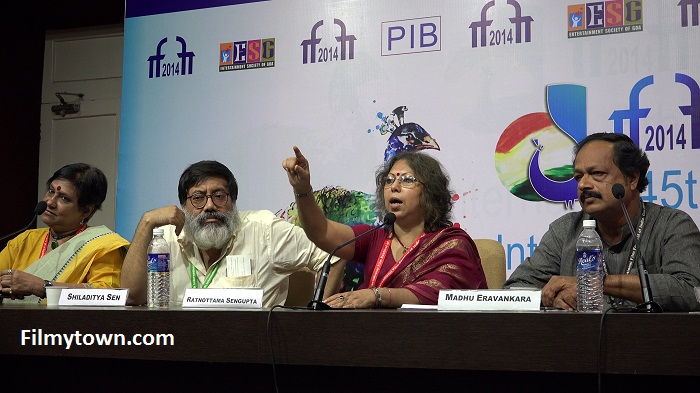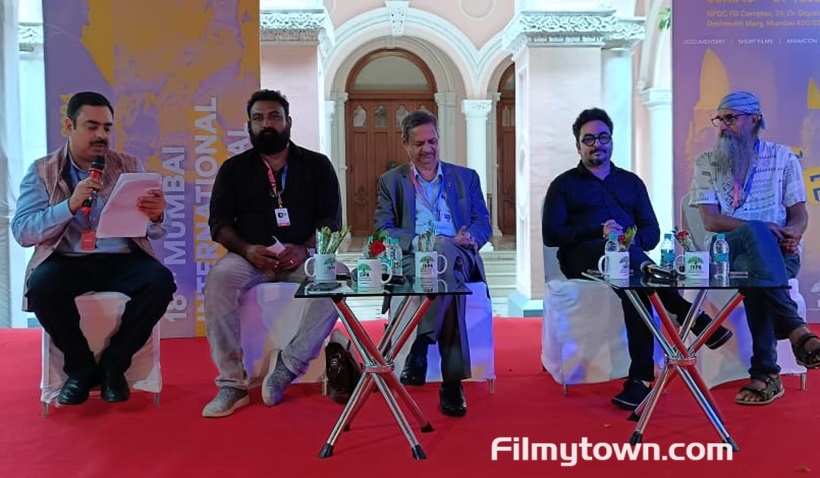IFFI Goa, Nov 24, 2014
Have Newspapers replaced Literature in Cinema? Gour Hari Dastaan, showing in the Indian Panorama at ongoing IFFI, was scripted from newspaper stories about a freedom fighter who fought the bureaucracy that denied his tamrapatra for 30 years. There was Jessica Lal, and there was Jolly LLB, and there are umpteen instances from Bengali, Malayalam, Tamil, Marathi, and Assamese cinema where the directors were inspired by headlines to mine the content of their films. Does this indicate literature’s failing to mirror contemporary issues, or a change in cinema’s needs?
This was the first interaction the Film Critics Circle of India (FCCI) initiated with media persons present here on Monday. Director Sudeshna Roy (Jodi Love Diley Na Praney), Malayalam film scholar and director Madhu Ernavarkara, film critic Siladitya Sen and film critic-curator Ratnottama Sengupta brought to fore issues that could be affecting cinema, which is meant for entertainment as much as for social introspection.
Time was when serious films sourced content from writers like Tagore, Bibhuti Bhushan, Premchand, U A Ananthamurthy, Bashir, Saikia… Today even Shakespeare’s Hamlet is being served on the hotbed of unrest in Kashmir. Is it because literature, which is reflection at leisure, becomes too ‘serious’ for cinema served with popcorn? Or is it because grandsons today want to see only themselves in the ‘selfies’ called cinema?
Literature and cinema are two entirely different art forms, as Madhu pointed out at the IFFI platform. The filmmaker, if he decides to use literature as source material, can then ‘translate’ it into the language of cinema. And only a person who knows the difference between the two media can make a good film from literature.
But is there a crisis of good literature today, asks Siladitya. Today there are two awards – for ‘original screenplay’ and for ‘adapted screenplay.’ Surely that isn’t why a filmmaker would want to write his own film. Oriya director Sabyasachi Mahapatra structures his film Adim Bichar on Sahitya Akademi winner but finds it difficult to release it in theatres “because it is seen as ‘serious’ film.”
Often writers too object to any deviation from published texts – be they novel or stories – although filmmakers have to think of tailoring the content for a 90 to 100-minute production, within a limited budget, Sudeshna Roy said. Last minute court cases are highly avoidable. That could be one of the reasons why filmmakers want to write ‘original screenplays’.
And then there is the other complexity – films often are remakes of hits in other languages. As such, directors don’t want to take upon themselves the onus of deviating from the tried and tested.
But perhaps the most important reason is that news stories, as they are discussed on channels, become a part of everyone’s life – more so than literature in any language. So, when a film is released about a rape victim (8.08er Bonga Local) or Shaji Karun’s Piravi.. more people would know about it than if a film is made from a Jnanpith winning novel or even from Tagore and Saratchandra, felt Ratnottama during IFFI 2014.
Pendekarq merupakan Agen bandarq Terbaik. Hanya dengan 1 id bisa bermain 7 permainan di PKV Games 100% tanpa robot




